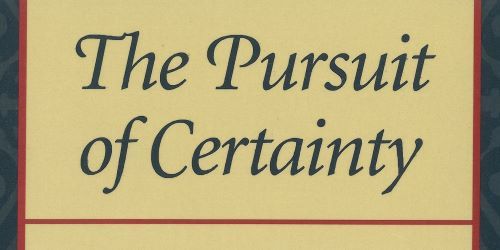The Pursuit of David Hume (and Certainty)

Shirley Robin Letwin’s The Pursuit of Certainty, focuses on David Hume (and others) to understand how politics changed over time in England. Amy Willis encourages you to read, think, and question Hume's ideas and how they are used by others.
Members of Peter Boettke’s EconLib subscription book club, No Due Date, recently engaged with Shirley Robin Letwin’s The Pursuit of Certainty, published by Liberty Fund. Boettke describes this selection as follows:
Shirely Robin Letwin was a British philosopher and political theorist known for her contributions to the study of conservatism, and in particular, her analysis of the ideas underpinning Margaret Thatcher’s policies. She received her PhD from the London School of Economics in 1956. While F. A Hayek was no longer teaching at LSE, he was her main intellectual influence and advisor.
Letwin, like Hayek, was a critic in the modern quest for a perfectly ordered society. In The Pursuit of Certainty, the reader encounters the ideas of [David] Hume, [Jeremy] Bentham, [John Stuart] Mill, and [Beatrice] Webb in detail as they wrestle with the desire for certainty, rationalism, ideology, tradition and custom, individual freedom, and the skepticism toward Utopia.
Letwin describes the project of the book as explaining how politics changed in the United Kingdom over time as being exemplified by the life and work of these four individuals. Politics, she says, used to be about more versus less government. Over time, she says, this debate has dissolved such that political disagreement has emerged as “clusters of conversation.” (Preface, p. x) The four subjects of her book are associated with this change as follows:
How the conception of politics changed in England can be traced through the lives and works of four writers… Each represents a distinctive way of looking at politics…each writer contributed to a transformed outlook on the nature of politics. It was first suggested by Jeremy Bentham; its shape was defined by John Stuart Mill; and the finished product appears in the work of Beatrice Webb. But the significance of what happened becomes plain only by comparison with the earlier view of David Hume.
We thought AdamSmithWorks readers would be particularly interested in the section on Hume, so I’m sharing the questions I posed to No Due Date readers in our online portal below. If you happen to know Letwin’s book, I hope these tickle your intellectual fancy. If not, perhaps you’ll be inspired to check it out.
Letwin paints a fair portrait of Hume, albeit more moderate than one usually encounters. (See the first question below.) The question I did not ask in the No Due Date portal (as yet anyway!) is this: Letwin’s final chapter on Hume, “The End of Profane Politics,” seems as if it could be a political manual for today. Letwin is recounting Hume’s grave fear of “fanaticism” in politics- far worse than religious fanaticism in his view. The danger of confusing morality with politics, and Hume’s view of public opinion in his age of revolution was dim. I’m interested in what readers today would have to say to Hume about our own times.
1. Letwin calls Hume a “man of moderation,” which may contrast with pictures more often painted of Hume (such as “the Infidel”). What do you make of this characterization, and how well do you think it fits Hume?
1. Letwin calls Hume a “man of moderation,” which may contrast with pictures more often painted of Hume (such as “the Infidel”). What do you make of this characterization, and how well do you think it fits Hume?
2. How did Hume address the tension between reason and passion, according to Letwin? To what extent is the tension resolved?
3. What did it mean to “do” philosophy for Hume, and how was this a break from his predecessors and contemporaries? What does Letwin suggest as Hume’s greatest contribution?
4. What did Hume think was the proper way of “doing” politics? How does Letwin describe what she calls the “proper political disposition” advocated by Hume, and what is its relationship to individual liberty?
5. What does Letwin mean by, “Liberty may all too easily be destroyed in the name of liberty.” (p. 101)
6. Letwin suggests that Hume saw politics as an art, not a science. (Wait till you get a load of Bentham! 😄) Can politics ever be moral, as Letwin describes Hume’s position? Why does she suggest that politics would not be attractive to “ordinary men,” (p. 121) and that the greatest statesmen may be the most dangerous politically?
And if you want to read and discuss David Hume more, Liberty Fund has two virtual reading groups that feature his ideas coming up: Personal Freedoms, Righting Wrongs, and the Nature of Man and Liberty, Law, and the Social Contract in Hobbes to Hume.
Want to read more?
Edwin van de Haar's Unexpected Insights of David Hume
Christy Lynn's A First Foray with David Hume's History of England
Jacob Hall's David Hume on the Common Law and English Liberty